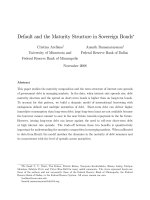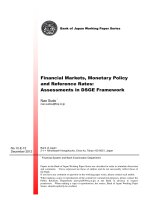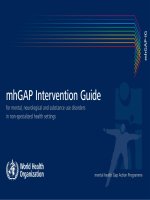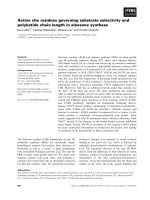Mental, Neurological, And Subtance Use Disorders In Sub-Saharan Africa docx
Bạn đang xem bản rút gọn của tài liệu. Xem và tải ngay bản đầy đủ của tài liệu tại đây (677.73 KB, 128 trang )
Copyright © National Academy of Sciences. All rights reserved.
Mental, Neurological, and Substance Use Disorders in Sub-Saharan Africa: Reducing the Treatment Gap, Improving Quality of Care: Workshop Summary
/>
Bruce M. Altevogt, Sarah L. Hanson, Zaam Namuli Ssali, and
Patricia Cuff, Rapporteurs
Forum on Neuroscience and
Nervous System Disorders
Board on Health Sciences Policy
Forum on Health and Nutrition
Uganda National Academy of Sciences
Copyright © National Academy of Sciences. All rights reserved.
Mental, Neurological, and Substance Use Disorders in Sub-Saharan Africa: Reducing the Treatment Gap, Improving Quality of Care: Workshop Summary
/>THE NATIONAL ACADEMIES PRESS • 500 Fifth Street, N.W. • Washington, DC 20001
NOTICE: The project that is the subject of this report was approved by the
Governing Board of the National Research Council, whose members are drawn from
the councils of the National Academy of Sciences, the National Academy of
Engineering, and the Institute of Medicine. It was also approved by the Uganda
National Academy of Sciences Executive Council.
This project was supported by contracts between the National Academy of Sciences
and the Alzheimer’s Association; AstraZeneca Pharmaceuticals, Inc.; CeNeRx
Biopharma; the Department of Health and Human Services’ National Institutes of
Health (NIH, Contract Nos. N01-OD-4-213, N01-OD-4-2139) through the National
Institute on Aging, the National Institute on Alcohol Abuse and Alcoholism, the
National Institute on Drug Abuse, the National Eye Institute, the NIH Blueprint for
Neuroscience Research, the National Institute of Mental Health, and the National
Institute of Neurological Disorders and Stroke; Eli Lilly and Company; GE
Healthcare, Inc.; GlaxoSmithKline, Inc.; Johnson & Johnson Pharmaceutical
Research and Development, LLC; Merck Research Laboratories; the National
Multiple Sclerosis Society; the National Science Foundation (Contract No. OIA-
0753701); the Society for Neuroscience; and Wyeth Research, Inc. The views
presented in this publication are those of the editors and attributing authors and do
not necessarily reflect the view of the organizations or agencies that provided
support for this project.
International Standard Book Number-13: 978-0-309-14880-1
International Standard Book Number-10: 0-309-14880-4
Additional copies of this report are available from the National Academies Press,
500 Fifth Street, N.W., Lockbox 285, Washington, DC 20055; (800) 624-6242 or
(202) 334-3313 (in the Washington metropolitan area); Internet, .
For more information about the Institute of Medicine, visit the IOM home page at:
www.iom.edu.
Copyright 2010 by the National Academy of Sciences. All rights reserved.
Printed in the United States of America
The serpent has been a symbol of long life, healing, and knowledge among almost
all cultures and religions since the beginning of recorded history. The serpent
adopted as a logotype by the Institute of Medicine is a relief carving from ancient
Greece, now held by the Staatliche Museen in Berlin.
Suggested citation: IOM (Institute of Medicine). 2010. Mental, Neurological, and
Substance Use Disorders in Sub-Saharan Africa: Reducing the Treatment Gap,
Improving Quality of Care: Summary of a Joint Workshop. Washington, DC: The
National Academies Press.
Copyright © National Academy of Sciences. All rights reserved.
Mental, Neurological, and Substance Use Disorders in Sub-Saharan Africa: Reducing the Treatment Gap, Improving Quality of Care: Workshop Summary
/>
Copyright © National Academy of Sciences. All rights reserved.
Mental, Neurological, and Substance Use Disorders in Sub-Saharan Africa: Reducing the Treatment Gap, Improving Quality of Care: Workshop Summary
/>
The National Academy of Sciences is a private, nonprofit, self-perpetuating
society of distinguished scholars engaged in scientific and engineering research,
dedicated to the furtherance of science and technology and to their use for the
general welfare. Upon the authority of the charter granted to it by the Congress
in 1863, the Academy has a mandate that requires it to advise the federal
government on scientific and technical matters. Dr. Ralph J. Cicerone is
president of the National Academy of Sciences.
The National Academy of Engineering was established in 1964, under the
charter of the National Academy of Sciences, as a parallel organization of
outstanding engineers. It is autonomous in its administration and in the selection
of its members, sharing with the National Academy of Sciences the
responsibility for advising the federal government. The National Academy of
Engineering also sponsors engineering programs aimed at meeting national
needs, encourages education and research, and recognizes the superior
achievements of engineers. Dr. Charles M. Vest is president of the National
Academy of Engineering.
The Institute of Medicine was established in 1970 by the National Academy of
Sciences to secure the services of eminent members of appropriate professions
in the examination of policy matters pertaining to the health of the public. The
Institute acts under the responsibility given to the National Academy of Sciences
by its congressional charter to be an adviser to the federal government and, upon
its own initiative, to identify issues of medical care, research, and education.
Dr. Harvey V. Fineberg is president of the Institute of Medicine.
The National Research Council was organized by the National Academy of
Sciences in 1916 to associate the broad community of science and technology
with the Academy’s purposes of furthering knowledge and advising the federal
government. Functioning in accordance with general policies determined
by the Academy, the Council has become the principal operating agency
of both the National Academy of Sciences and the National Academy
of Engineering in providing services to the government, the public, and the
scientific and engineering communities. The Council is administered jointly
by both Academies and the Institute of Medicine. Dr. Ralph J. Cicerone and
Dr. Charles M. Vest are chair and vice chair, respectively, of the National
Research Council.
www.national-academies.org
Copyright © National Academy of Sciences. All rights reserved.
Mental, Neurological, and Substance Use Disorders in Sub-Saharan Africa: Reducing the Treatment Gap, Improving Quality of Care: Workshop Summary
/>
Uganda National Academy of Sciences
Website: www.ugandanationalacademy.org
E-mail: or
The Uganda National Academy of Sciences (UNAS) is an autonomous
body that brings together a diverse group of scientists from the physical,
biological, social, and behavioral sciences to work together in an
interdisciplinary and transdisciplinary manner. The main goal of UNAS
is to promote excellence in science by offering independent evidence-
based advice for the prosperity of Uganda. UNAS was granted a charter
to operate as the National Academy of Uganda by H. E. Yoweri Kaguta
Museveni, the President of the Republic of Uganda, in January 2009.
Copyright © National Academy of Sciences. All rights reserved.
Mental, Neurological, and Substance Use Disorders in Sub-Saharan Africa: Reducing the Treatment Gap, Improving Quality of Care: Workshop Summary
/>
Copyright © National Academy of Sciences. All rights reserved.
Mental, Neurological, and Substance Use Disorders in Sub-Saharan Africa: Reducing the Treatment Gap, Improving Quality of Care: Workshop Summary
/>
vii
WORKSHOP ON QUALITY OF CARE ISSUES FOR
MENTAL HEALTH AND NEUROLOGICAL DISORDERS
IN SUB-SAHARAN AFRICA PLANNING COMMITTEE
*
STEVEN E. HYMAN (Co-chair), Harvard University
EDWARD K. KIRUMIRA (Co-chair), Makerere University
FLORENCE BAINGANA, Makerere University
TIMOTHY COETZEE, National Multiple Sclerosis Society
WILSON COMPTON, National Institute on Drug Abuse
JUDY ILLES, University of British Columbia
ANGELINA KAKOOZA-MWESIGE, Makerere University
WALTER KOROSHETZ, National Institute of Neurological Disorders
and Stroke
ALAN I. LESHNER, American Association for the Advancement
of Science
MICHELLE M
CMURRY, Aspen Institute
CHARLES NEWTON, KEMRI-Wellcome Research Programme
DONALD SILBERBERG, University of Pennsylvania School of
Medicine
Study Staff
BRUCE M. ALTEVOGT, Project Director, IOM
PATRICIA CUFF, Project Director, IOM
CHRISTIAN ACEMAH, Senior Program Associate, IOM
SARAH L. HANSON, Associate Program Officer, IOM (until June
2010)
ZAAM NAMULI SSALI, Program Officer, UNAS
LORA K. TAYLOR, Senior Project Assistant, IOM
___________________________
∗
IOM planning committees are solely responsible for organizing the workshop,
identifying topics, and choosing speakers. The responsibility for the published workshop
summary rests with the workshop rapporteurs and the institution.
Copyright © National Academy of Sciences. All rights reserved.
Mental, Neurological, and Substance Use Disorders in Sub-Saharan Africa: Reducing the Treatment Gap, Improving Quality of Care: Workshop Summary
/>INSTITUTE OF MEDICINE FORUM ON
NEUROSCIENCE AND NERVOUS SYSTEM DISORDERS
*
ALAN I. LESHNER (Chair), American Association for the
Advancement of Science
HUDA AKIL, University of Michigan
MARC BARLOW, GE Healthcare, Inc.
MARK BEAR, Massachusetts Institute of Technology
DANIEL BURCH, CeNeRx Biopharma
DENNIS CHOI, Emory University
TIMOTHY COETZEE, National Multiple Sclerosis Society
DAVID COHEN, Columbia University
EMMELINE EDWARDS, NIH Neuroscience Blueprint (since
February 2010)
RICHARD FRANK, GE Healthcare, Inc.
JOHN GRIFFIN, Johns Hopkins University School of Medicine
RICHARD HODES, National Institute on Aging
KATIE HOOD, Michael J. Fox Foundation for Parkinson’s Research
STEVEN E. HYMAN, Harvard University
THOMAS INSEL, National Institute of Mental Health
STORY LANDIS, National Institute of Neurological Disorders and Stroke
HUSSEINI MANJI, Johnson & Johnson Pharmaceutical Research and
Development, LLC
EVE MARDER, Brandeis University
JONATHAN MORENO, University of Pennsylvania School of
Medicine
MICHAEL OBERDORFER, NIH Neuroscience Blueprint (until
January 2010)
KATHIE OLSEN, National Science Foundation (until May 2010)
ATUL PANDE, GlaxoSmithKline, Inc.
MENELAS PANGALOS, Pfizer, Inc.
STEVEN PAUL, Eli Lilly and Company
WILLIAM POTTER, Merck Research Laboratories
___________________________
*
IOM forums and roundtables do not issue, review, or approve individual documents.
The responsibility for the published workshop summary rests with the workshop
rapporteurs and the institution.
viii
Copyright © National Academy of Sciences. All rights reserved.
Mental, Neurological, and Substance Use Disorders in Sub-Saharan Africa: Reducing the Treatment Gap, Improving Quality of Care: Workshop Summary
/>PAUL SIEVING, National Eye Institute
RAE SILVER, Columbia University
WILLIAM THIES, Alzheimer’s Association
NORA VOLKOW, National Institute on Drug Abuse
KENNETH WARREN, National Institute on Alcohol Abuse and
Alcoholism
FRANK YOCCA, AstraZeneca Pharmaceuticals
STEVIN ZORN, Lundbeck USA
CHARLES ZORUMSKI, Washington University School of Medicine
IOM Staff
BRUCE M. ALTEVOGT, Forum Director
SARAH L. HANSON, Associate Program Officer (until June 2010)
LORA K. TAYLOR, Senior Project Assistant
ANDREW POPE, Director, Board on Health Sciences Policy
ix
Copyright © National Academy of Sciences. All rights reserved.
Mental, Neurological, and Substance Use Disorders in Sub-Saharan Africa: Reducing the Treatment Gap, Improving Quality of Care: Workshop Summary
/>UGANDA NATIONAL ACADEMY OF SCIENCES FORUM
ON HEALTH AND NUTRITION
*
EDWARD K. KIRUMIRA (Chair), Faculty of Social Sciences,
Makerere University
THOMAS G. EGWANG, Medi-Biotech Labs, Kampala; Executive
Secretary, AAS, Nairobi
JOHN TUHE KAKITAHI, Institute of Public Health, College of
Health Sciences, Makerere University
FIB KAYANJA, Vice Chancellor, Mbarara University of S&T
GERALD T. KEUSCH, Director, Global Health Initiative, Boston
University
JAMES MAKUMBI, Director of Medical Services, Uganda People's
Defense Force
KEITH M
CADAM, Infectious Diseases Institute, Medical School,
Makerere University
PETER NDIMBIRE MUGYENYI, Executive Director, Joint Clinical
Research Centre, Kampala
SPECIOSA K. NAIGAGA, Wandira, Concave International, Kampala
VINCENT OKETCHO, Country Director, AMREF Uganda
LINDA QUICK, Centers for Disease Control, Entebbe, Uganda
NELSON SEWANKAMBO, College of Health Sciences, Makerere
University
Study Staff
PAUL NAMPALA, Executive Secretary
ZAAM NAMULI SSALI, Forum Director
HARRIET NANFUMA, Financial Officer
___________________________
*
UNAS forums do not issue, review, or approve individual documents. The responsi-
bility for the published workshop summary rests with the workshop rapporteurs and the
institution.
x
Copyright © National Academy of Sciences. All rights reserved.
Mental, Neurological, and Substance Use Disorders in Sub-Saharan Africa: Reducing the Treatment Gap, Improving Quality of Care: Workshop Summary
/>UGANDA NATIONAL ACADEMY OF
SCIENCES COUNCIL
*
PAUL E. MUGAMBI, President
WILLIAM BANAGE, Fellow
SAIMO KAHWA, Member
A. M. S. KATAHOIRE, Treasurer
EDWARD K. KIRUMIRA, Fellow and Chair, Forum on Health and
Nutrition
HAM-MUKASA MULIRA, Fellow
FINA OPIO, Fellow
PATRICK R. RUBAIHAYO, Fellow
E. N. SABIITI, Vice President
Council Staff
PAUL NAMPALA, Executive Secretary
ZAAM NAMULI SSALI, Program Officer
FRANKLIN MUYONJO, Program Officer
HARRIET NANFUMA, Financial Officer
PATRICK OCHAPET, Office Clerk
___________________________
*
The UNAS Council does not issue, review, or approve individual documents. The
responsibility for the published workshop summary rests with the workshop rapporteurs
and the institution.
x
i
Copyright © National Academy of Sciences. All rights reserved.
Mental, Neurological, and Substance Use Disorders in Sub-Saharan Africa: Reducing the Treatment Gap, Improving Quality of Care: Workshop Summary
/>
Copyright © National Academy of Sciences. All rights reserved.
Mental, Neurological, and Substance Use Disorders in Sub-Saharan Africa: Reducing the Treatment Gap, Improving Quality of Care: Workshop Summary
/>
Reviewers
This report has been reviewed in draft form by individuals chosen for
their diverse perspectives and technical expertise, in accordance with
procedures approved by the National Research Council’s Report Review
Committee. The purpose of this independent review is to provide candid
and critical comments that will assist the institution in making its pub-
lished report as sound as possible and to ensure that the report meets in-
stitutional standards for objectivity, evidence, and responsiveness to the
study charge. The review comments and draft manuscript remain confi-
dential to protect the integrity of the process. We wish to thank the fol-
lowing individuals for their review of this report:
Albert Akpalu, University of Ghana–Medical School
Marcelo Cruz, Global Network for Research on Mental and
Neurological Health, Ecuador
Oye Gureje, University of Ibadan, Nigeria
Seggane Musisi, Makerere Medical School, Mulago Hospital,
Uganda
Although the reviewers listed above have provided many construc-
tive comments and suggestions, they did not see the final draft of the re-
port before its release. The review of this report was overseen by
Richard T. Johnson, Johns Hopkins University School of Medicine.
Appointed by the Institute of Medicine, he was responsible for making
certain that an independent examination of this report was carried out in
accordance with institutional procedures and that all review comments
were carefully considered. Responsibility for the final content of this
report rests entirely with the authoring committee and the institution.
x
iii
Copyright © National Academy of Sciences. All rights reserved.
Mental, Neurological, and Substance Use Disorders in Sub-Saharan Africa: Reducing the Treatment Gap, Improving Quality of Care: Workshop Summary
/>
Copyright © National Academy of Sciences. All rights reserved.
Mental, Neurological, and Substance Use Disorders in Sub-Saharan Africa: Reducing the Treatment Gap, Improving Quality of Care: Workshop Summary
/>Preface
According to the World Health Organization, disorders of the
nervous system—mental, neurological, and substance use disorders—
produce substantial disease burden in the developing world. The
longstanding focus on infectious disease has obscured their high
prevalence and toll on societies, but these disorders, in aggregate, are
significant causes of disability in adults and impede human capital
formation by their effects on children. Caring for these patients poses a
formidable challenge for individuals, families, governments, and
societies around the world. Given the existence of cost-effective
treatments for many of these disorders, improving both access to care
and quality of care could go far to alleviate disease burden. However,
resource constraints, disorder stigmatization, shortages of trained
personnel, and a lack of understanding of the causes of the disorders
limit the amount and quality of care that many individuals receive.
Despite the high prevalence and disease burden of these disorders,
most countries in sub-Saharan Africa have less than one psychiatrist per
million people. The situation is also grim for psychiatric nurses,
psychologists, and trained social workers. The total number of
neurologists in the region may be even smaller. The formularies are
extremely limited, often containing only older medications with a high
side-effect burden; even for these drugs, supply chains often break down,
making patient adherence to often complicated medication regimens
nearly impossible. These and other deficits in treatment systems result
not only in needless suffering, but also in chronic disability for patients
and limitations on the ability of caregivers to function outside the home.
xv
Copyright © National Academy of Sciences. All rights reserved.
Mental, Neurological, and Substance Use Disorders in Sub-Saharan Africa: Reducing the Treatment Gap, Improving Quality of Care: Workshop Summary
/>xvi PREFACE
At a national level, these consequences seriously interfere with economic
development.
Despite research showing the disability and premature mortality
resulting from disorders of the nervous system, systematic
epidemiological data are lacking in most countries of sub-Saharan
Africa. Most experts agree that the scope of unrecognized illness is far
greater than the documented cases, and data on children and elderly are
particularly sparse. Researchers face further challenges because often
patients are hidden from the community out of fear, which makes
obtaining accurate data difficult. Without more complete information
about the scope of the problem, the countries’ leaders are not addressing
the needs of persons with these disorders. The needs include improved
access to training for healthcare providers and access to better
equipment, more personnel, appropriate medicines, and other needed
resources. Improved quality of care for individuals suffering from
mental, neurological, and substance use disorders must be a high priority
for governments and societies so appropriate investments are made to
provide proper care and treatment for these individuals.
Addressing the need to advance these important discussions, the U.S.
Institute of Medicine’s Forum on Neuroscience and Nervous System
Disorders, in collaboration with the Forum on Health and Nutrition of the
Uganda National Academy of Sciences, convened an international
workshop on quality of care issues for nervous system disorders in sub-
Saharan Africa on August 4 and 5, 2009, in Kampala, Uganda.
Recognizing both the importance of providing high-quality care for
disorders of the nervous system and the resource limitations of most sub-
Saharan African countries in diagnosing and treating these disorders, the
workshop participants explored strategies to improve care for the
countless individuals suffering from nervous system disorders. Other
aims of the workshop were to discuss opportunities that can be used to
improve continuity of care and sustainability within a country’s
healthcare system, and to identify resources that are currently available
or could be made available to aid in implementation of treatments and
prevention projects.
Many key stakeholders attended, including more than 30 speakers,
120 audience members, and representatives from 16 countries.
Stakeholders included government policy makers from African countries
and the World Health Organization, clinicians, researchers, individuals
representing non-governmental organizations, and patient advocates.
The workshop represented a true collaboration between the U.S.
Institute of Medicine of the National Academies and the Uganda
Copyright © National Academy of Sciences. All rights reserved.
Mental, Neurological, and Substance Use Disorders in Sub-Saharan Africa: Reducing the Treatment Gap, Improving Quality of Care: Workshop Summary
/>PREFACE xvii
National Academy of Sciences. Staff from each organization worked
closely with an extremely dedicated planning committee that brought
together an international cohort with expertise in neuroscience, ethics,
pediatrics, drug abuse, international public health, mental health, and
neurological disorders. Important and energetic discussions followed
well into the evening reception hour, which reinforced a goal of the
meeting—to facilitate networking and open discussion between various
stakeholders.
Some of the major areas of emphasis and recurring themes that were
discussed and presented at the workshop include
• exploring the need to consider all disorders of the nervous
system, including addictive disorders;
• sharing the benefit of leveraging skills, expertise, and networks
of other health fields (e.g., HIV/AIDS, malaria);
• maintaining a focus on treatment and prevention;
• improving the available medication formulary for nervous
system disorders;
• supporting demonstration projects examining
o mechanisms to improve availability of medications and
care in rural settings and the
o role of information technology in improving awareness,
training, and treatment, especially in rural settings;
• expanding the use of high-quality, community-based care, and the
training of community health workers;
• collecting further data on effectiveness; and
• supporting the need for champions who will relay these, and
future, needs and concerns to resource providers.
The areas of emphasis suggest the need for more action and
investment by all stakeholders, national and international. Real progress
in the region will depend on forging partnerships that draw on a broad
range of resources and skill sets. Most important is a commitment from
stakeholders to make changes and improvements to the current system.
The workshop demonstrated that there is great enthusiasm and desire to
improve what is currently in place, but partners are needed. This
workshop presented a timely and unique opportunity to capitalize on the
rich ideas, networks, and momentum that came from participants. Clearly
there is a need to improve care for individuals with mental, neurological,
and substance use disorders in sub-Saharan Africa, and we hope that this
Copyright © National Academy of Sciences. All rights reserved.
Mental, Neurological, and Substance Use Disorders in Sub-Saharan Africa: Reducing the Treatment Gap, Improving Quality of Care: Workshop Summary
/>xviii PREFACE
workshop and summary will help lay the foundation for continued
progress.
Steven E. Hyman, Co-chair
Edward K. Kirumira, Co-chair
Copyright © National Academy of Sciences. All rights reserved.
Mental, Neurological, and Substance Use Disorders in Sub-Saharan Africa: Reducing the Treatment Gap, Improving Quality of Care: Workshop Summary
/>xix
Contents
INTRODUCTION 1
About the Workshop and Forums, 3
1 BACKGROUND 5
Establishing a Common Terminology, 5
The MNS Disease Burden, 6
Stigma and Human Rights, 17
2 SYSTEMS OF CARE FOR MNS IN
SUB-SAHARAN AFRICA 21
The MNS Treatment Gap, 21
Healthcare System Challenges, 23
Overcoming Healthcare System Challenges, 28
3 MNS HEALTHCARE POLICY 43
Case Study: Uganda Mental Health Policy, 44
Case Study: South Africa, 47
4 NEEDS, OPPORTUNITIES, AND NEXT STEPS 51
Need for Sustainable, Feasible Strategies, 51
Collaboration, 52
Next Steps, 58
Copyright © National Academy of Sciences. All rights reserved.
Mental, Neurological, and Substance Use Disorders in Sub-Saharan Africa: Reducing the Treatment Gap, Improving Quality of Care: Workshop Summary
/>xx CONTENTS
APPENDIXES
A Putting into Context MNS Disorders in Sub-Saharan Africa 61
B References 67
C Agenda 73
D Registered Attendees 89
E Speaker Biographies 95
Copyright © National Academy of Sciences. All rights reserved.
Mental, Neurological, and Substance Use Disorders in Sub-Saharan Africa: Reducing the Treatment Gap, Improving Quality of Care: Workshop Summary
/>Introduction
1
Disorders of the nervous system are common to all countries and
cause tremendous suffering. The stigma and violations of human rights
directed toward people with these disorders often increases their social
isolation and can be the cause of staggering social and economic conse-
quences. In sub-Saharan Africa—where the majority of the world’s
poorest countries with the least resources are found—the burden of men-
tal health, neurological, and substance use (MNS) disorders is especially
significant. Epilepsy, depression, and drug and alcohol abuse affect the
lives of millions of Africans, disrupting the daily course of life, challeng-
ing families, and weighing on the social and economic fabric of the re-
gion (Prince et al., 2007). Current data from the more than 47 countries
that constitute sub-Saharan Africa make it clear that, at a minimum,
many of these problems are much more common in this region than in
other parts of the world (Forsgren, 2008; The global burden of disease: A
comprehensive assessment of mortality and disability from diseases,
injuries and risk factors in 1990 and projected to 2020, 1996; Ngoungou
et al., 2006; Okasha, 2002).
According to the World Health Organization, awareness about the
importance of mental disorders for public health has greatly increased
_____________________________
1
The planning committee’s role was limited to planning the workshop, and the workshop
summary has been prepared by the workshop rapporteurs as a factual summary of what
occurred at the workshop.
1
Copyright © National Academy of Sciences. All rights reserved.
Mental, Neurological, and Substance Use Disorders in Sub-Saharan Africa: Reducing the Treatment Gap, Improving Quality of Care: Workshop Summary
/>2 MNS IN SUB-SAHARAN AFRICA, IMPROVING QUALITY OF CARE
and has put mental health on the policy agenda (WHO, 2008b). Many
countries have developed or revised their policies, programs, and legisla-
tion related to these disorders. Despite this, as will be discussed in further
detail, the treatment gap is tremendous and the resources provided to
tackle the huge combined burden of MNS disorders, not just mental
health, are insufficient. The “rich” countries such as the United States
and England have roughly 200 times more psychiatrists than most coun-
tries in Africa. This ratio is even worse when looking at the enrollment of
the medical professionals such as psychiatric nurses and clinical psy-
chologists. To add to these challenges, within each country mental health
professionals are concentrated in urban areas, where a minority of the
population lives. In addition, health professionals are increasingly work-
ing in the private sector, resulting in decreased access for a significant
proportion of the populations.
Many neurological disorders remain undiagnosed because of the lim-
ited diagnostic facilities at health centers, which is even worse in the ru-
ral places where the majority of the patients reside. Often much-needed
drugs are in short supply or are too expensive to purchase. In the end, the
patients and their families prefer to stay at home or revert to readily
available and accessible remedies within their communities. For many in
sub-Saharan Africa, this means relying on traditional healers for health
care. These providers are more accessible than mental, neurological, or
substance use disorder specialists, and they frequently provide continuity
of care and social support for patients. An estimated 60–80 percent of
individuals with mental disorders in developing countries first seek care
through traditional healers (Abbo et al., 2008). Despite the widespread
use of traditional healers in sub-Saharan Africa, there is no standard of
care and there is little evidence from which to assess its effectiveness. As
a result, there is an ongoing debate about whether traditional healers
should be recognized as part of the healthcare delivery system, and, if so,
how they could be more formally integrated into the healthcare delivery
system.
Other solutions to the human resource shortfalls are also being ad-
dressed. One suggestion is to use “task shifting,” which transfers a range
of medical tasks, where appropriate, from more expensive and special-
ized medical workers to people with shorter training and therefore a
much lower cost in the health system. Many workshop participants be-
lieve this approach makes more efficient use of the human resources that
are available in the health system and is one way of closing the mental
health treatment gap. However, without the political will of governments
and the support of international donor communities, adequate resources
Copyright © National Academy of Sciences. All rights reserved.
Mental, Neurological, and Substance Use Disorders in Sub-Saharan Africa: Reducing the Treatment Gap, Improving Quality of Care: Workshop Summary
/>INTRODUCTION 3
for much-needed drugs, delivery systems, facilities, and professionals are
unlikely to be realized any time soon. Within this context, a workshop
was held in Uganda to discuss model solutions, promote collaborations,
and consider what can be done to improve quality of care for patients in
cost-effective ways.
ABOUT THE WORKSHOP AND FORUMS
In August 2009 the Uganda National Academy of Sciences Forum
on Health and Nutrition and the U.S. Institute of Medicine’s Forum on
Neuroscience and Neurological Disorders (Box I-1) jointly hosted a
workshop in Kampala, Uganda, titled Quality of Care Issues for Mental
Health and Neurological Disorders in Sub-Saharan Africa. More than
150 researchers, providers, patient advocates, and policy specialists came
together to discuss the current state of care for mental, neurological, and
substance use disorders in sub-Saharan Africa. The goal was to uncover
strategies to improve the quality and consistency of care delivered in
sub-Saharan Africa, taking into account resource constraints, infrastruc-
ture limitations, and other realities. Workshop speakers were charged to
do the following:
• Discuss opportunities to ensure continuity of care and provide
sustainable care within a country’s existing healthcare system.
• Identify resources that are either currently available, or that
could be made available in cost-effective and efficient ways, to
aid in the treatment and prevention of disease.
• Examine the need for national, evidence-based policies within
national healthcare systems that address quality-of-care issues
for mental, neurological, and substance use disorders.
• Explore opportunities to facilitate collaborations among a variety of
stakeholders, including policy makers and healthcare professionals.
Copyright © National Academy of Sciences. All rights reserved.
Mental, Neurological, and Substance Use Disorders in Sub-Saharan Africa: Reducing the Treatment Gap, Improving Quality of Care: Workshop Summary
/>4 MNS IN SUB-SAHARAN AFRICA, IMPROVING QUALITY OF CARE
BOX I-1
UNAS Forum on Health and Nutrition
The Uganda National Academy of Sciences (UNAS) Forum on Health and
Nutrition was established in 2006 to provide a structured opportunity for stake-
holder discussion and scrutiny of critical and possibly contentious scientific and
policy issues of shared concern related to issues of health and nutrition in
Uganda and throughout the world.
a
The Forum aims to do the following:
• Promote a free flow of information between public- and private-
sector leaders and groups and individuals, including policy makers
and others who influence public policy and opinion.
• Clarify research and policy issues, identify options for research, and
encourage further exploration in the identified areas.
• Inform decision and policy makers, both in the public and private
sectors, on issues related to health and nutrition both in Uganda
and worldwide.
• Enable and develop initiatives that require in-depth exploration, re-
view, or analysis, where new strategies are necessary to improve
health and nutrition.
IOM Forum on Neuroscience and Nervous System Disorders
Established in 2006, the Institute of Medicine’s (IOM’s) Neuroscience
Forum aims to foster dialogue among a broad range of stakeholders—
practitioners, policy makers, private industry, community members, academ-
ics, and others—and to provide these stakeholders with opportunities to
tackle issues of mutual interest and concern. The Forum’s neutral venue
provides a place for broad-ranging discussions that can help in the coordina-
tion and cooperation of all stakeholders to enhance understanding of neuro-
science and nervous system disorders. The Forum concentrates on six ar-
eas: nervous system disorders, mental illness and addiction, genetics of
nervous system disorders, cognition and behavior, modeling and imaging,
and ethical and social issues.
b
Specifically, the Neuroscience Forum
• sponsors workshops for members and the public to discuss strate-
gies to resolve key challenges identified by Forum members;
• educates the public, press, and policy makers;
• strives to enhance understanding of research and clinical issues
associated with the nervous system; and
• fosters partnerships and information sharing among stakeholders.
_____________________________
a
See
b
See
Copyright © National Academy of Sciences. All rights reserved.
Mental, Neurological, and Substance Use Disorders in Sub-Saharan Africa: Reducing the Treatment Gap, Improving Quality of Care: Workshop Summary
/>1
Background
ESTABLISHING A COMMON TERMINOLOGY
Although all disorders of the nervous system are related due to their
common origin, the absence of a common terminology can negatively
impact the establishment of common policies. Throughout the workshop,
participants used many different terms to describe the many mental
health, neurological, and substance use (MNS) disorders that impact the
populations of sub-Saharan Africa (SSA). However, Marcelo Cruz,
president of the Global Network for Research on Mental and Neurologi-
cal Health, Ecuador, suggested that in order to include a wide range of
disorders that are often otherwise separated into treatment silos in devel-
oped countries, such as neurology, psychiatry, psychology, substance use
etc.; the World Health Organization’s (WHO’s) term “MNS disorders”—
covering m
ental health, neurological, and substance use disorders—
should be adopted. Workshop participants agreed, and thus it was
adopted for use during the workshop and in this summary.
MNS disorders encompass a wide range of conditions of the brain
from depression to epilepsy to alcohol abuse. These and the many other
MNS disorders found throughout the world are often linked in a complex
way with other health conditions (WHO, 2008a). They may be comorbid
or risk factors for noncommunicable and communicable diseases like
HIV/AIDS, malaria, and tuberculosis. MNS also factors into sexual and
reproductive health in, for example, postpartum depression or injuries from
violence or traffic accidents. Furthermore, depression and substance use
disorders adversely affect adherence to treatment for other diseases, often
exacerbated by poverty and the presence of endemic infectious diseases.
The scientific underpinnings of MNS are now better understood.
Most have their origins in abnormal brain structure or function. There-
fore, given the related nature of MNS, better integration of these special-
ties is needed, especially neurology and psychiatry (Fenton et al., 2004;
5









